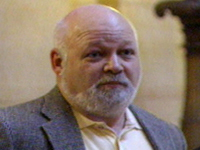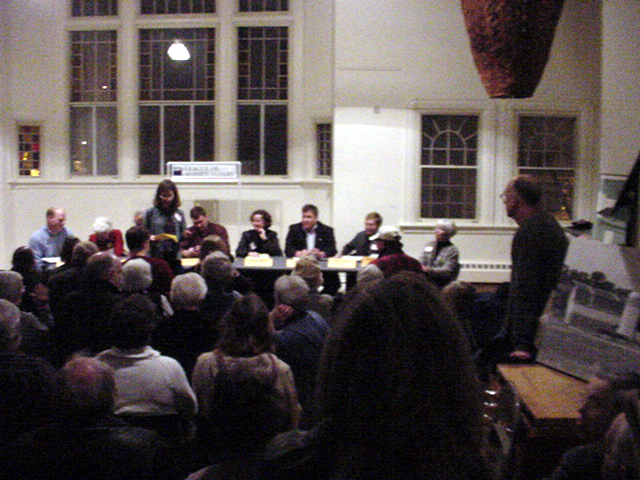Loren Jennings’ sentencing nears…
February 6th, 2006

And speaking of corruption, on this side of the river, we have Loren Jennings featured in the Post Review:
Sentencing date set for March 6 for Loren Jennings
Posted: 2/1/06
by Howard Lestrud
A sentencing date for former State Rep. Loren Jennings, of Harris, has been set, according to his attorneys Douglas A. Kelley and Steve Wolter. Jennings will appear for sentencing before U.S. District Court Judge Richard Kyle at 8:30 a.m. Monday, March 6, 2006, in St. Paul.
Jennings was convicted last July 26 of two counts of mail fraud and one count of money laundering.
Jennings was acquitted on four other counts including conspiracy charges to commit mail fraud and to commit money laundering.
The state lawmaker for 18 years, was accused of using his office to financially benefit a firm in which he had a financial investment. Jennings was defeated in a re-election bid in 2002. He ran as a Democrat each of his nine terms and several times, ran successfully in a primary after losing his partyâ??s endorsement.
During his time as a legislator, Jennings served as chairman of the House Regulated Industries Committee, which deals with utility issues. He became known for advocating expanded nuclear waste storage at the Prairie Island nuclear power plant. He and the then senator from his district, the late Sen. Janet Johnson, were at opposite sides of the spectrum on this issue.
Jennings was accused of using his position in the House to pass legislation that made it possible for ratepayersâ?? conservation funds to be spent on a utility pole recycling company, Northern Pole Inc. Jenningsâ?? companies loaned about $670,000 to Northern Pole. Jenningsâ?? lobbying of Minnesota Power and Northern States Power Co. (now Xcel Energy) resulted in payments of $650,000 to Northern Pole from conservation funds. More than $284,000 was said to have made payments on Jenningsâ?? loans.
Jennings faces a maximum sentence of five years in prison, a $250,000 fine or both on each count of mail fraud, and up to 10 years in prison, a $250,000 fine or both on the money laundering charge. The presentence investigation is now complete. Attorney Wolter said there may be some additional filings before sentencing.
Attorney Wolter said Jenningsâ?? legal team is optimistic that Judge Kyle will not give a sentence along the guidelines established by the government. â??There are many reasons Judge Kyle should be showing leniency,â? said Wolter. He pointed out that Almelund banker John James, who testified against Jennings, was sentenced to 18 months in prison for bank fraud and related charges.
Kelley and Wolter said that an appeal of the conviction will be filed within seven days of sentencing.
Memorial for Sheila
February 5th, 2006
Sheila died today. She was Linda’s favorite, Linda Hanson of “World Organization for Landowner Freedom” in the Arrowhead transmission case. Sheila’s liver had failed, and the Hanson’s kept her comfortable as long as they could. There’s two of Sheila’s pups still with their family, here’s my favorite, Angel, a beautiful shep:
The “Windy” City has … gasp… WIND!
February 5th, 2006

One of the Springer turbines goes up near Owatonna, Minnesota
A million miles in a #)(*)^$%(*&% truck taught me a few things, one of which was that “The Market” is in “The Windy.” They’ve since built a new produce center, but it’s still, in trucker lingo, “The Windy.” And “The Windy” is in Illinois.

Chicago’s old Water Market — imagine navigating this in a long nose Pete with a 48′ bustle at 2 a.m., something I’d rather forget.
I digress… anyway, sigh… I heard again recently the claim that all this transmission across Minnesota is needed to get ND and SD wind to Illinois because Illinois doesn’t have wind. My official professional legal opinion of that: WHAT A LOAD OF CRAP! … ahem… There is wind in Illinois, and there’s wind potential in Illinois, and there’s even wind REALIZED in Illinois. Here’s the real poop from the DOE, which incorporates in their new wind information, which goes beyond those estimates I saw a few years back:
Here’s how they figure the “9,000MW potential” wind capacity, with the understanding that this is just like all other “potential” estimates, what good is it if it isn’t developed. As John Dunlop says, capacity matters, BUT if you’re figuring 30% line loss for SW MN to Metro, 200 miles, what is line loss for transmission lines three times as long — 90% line loss, eh? So then what’s the point of generating wind and transmitting it long distances? It sure isn’t efficient. Anyway, here’s the verbatim DOE take on Illinois capacity:
The wind potential from these windy lands is about 3000 MW of installed wind generation capacity. In a class 4 wind regime, the annual average output of a wind power plant is typically about 25% of the installed capacity. The class 4 areas represent about 0.4% of Illinois’ land and are largely rural agricultural areas.
Because of likely advances in technology and the significant incentives available in Illinois, a number of additional areas with only slightly lower wind resource (class 3+, or 14.3 – 15.7 mph) may also be suitable for wind development. These class 3+ areas highlighted on the map of best areas represent an additional 6000 MW of wind potential.
The total amount of class 4 and 3+ lands combined is about 1800 square kilometers (1.2% of Illinois’ land area), and the wind potential from these areas is about 9000 MW. Each square kilometer may support about 5 MW of installed wind capacity. All urban and environmentally-sensitive lands (state parks, wildlife refuges, etc) have been excluded in estimating the wind potential.
Bottom line? The “wind is needed in Illinois” is a poor rationalization for enabling construction of utility infrastructure at our expense so utilities can profit from unregulated activity where there is no market (and if you’re thinking, “but they won’t profit if there’s no market, that’s right, that’s a big part of the problem, because then we’re holding the bill for something we paid them to build and went belly up — it’s where developing nations are when the IMF overprojects need and ‘loans’ them money to build what they don’t need — prices rise to cover debt service and r egular people can’t afford essential services and next thing you know they’ve got rioting in the street! Don’t forget that Mesaba’s Julie Jorgensen cut her teath on IMF and World Bank utility financing.)
“Oh, well, we need it in Wisconsin… yeah, that’s it… we need it in Wisconsin.” Yeah, right… here’s the Wisconsin info: Wisconsin Wind Maps
According to this 2004 ELPC Wind Map, there’s 3 times as much wind proposed for WI (1,657MW) as there is for SD, and 6 times as much wind proposed for ILLINOIS (3,119MW) as there is for SD.
Don’t buy this “we need it in (name that easterly state)” crock o’ crap — remember that wind blows everwhere, and much of it is sufficient to generate wind. Key words to remember: SUFFICIENT and EFFICIENT. For any project, ask what it does for the local economy, and ask what it does to decrease need for noxious generation.
Corrupt politicans — over the river
February 4th, 2006
The Mississippi River doesn’t stop the infestation of pissy deer disease (or is it chronically wasted deer?) and I doubt it contains political corruption. Today’s paper is full of whining politicans caught taking money from utilities, and caucus employees doing campaign work on caucus/taxpayer time. They got caught in Wisconsin, and are pleading guilty faster than court reporters can type! Former goobernatorial candidate Chuck Chvala has plead and they’re arguing about restitution, and current Gov. Doyle is under investigation. But not to worry, a handful of Repugs have been caught too! In Wisconsin, they’re equal opportunity prosecutors.

Former WI State Senator Chuck Chvala
In the St.PPP today is Chvala’s whining about nominal restitution: Prosecutors propose Chvala pay $2,044 in restitution
Prosecutors want former Senate Majority Leader Chuck Chvala to pay $2,044.96 in restitution for having state workers campaign on state time.
The Madison Democrat’s attorney has filed an objection to that amount.
“There isn’t even any basis for the $2,044,” James Olson said.
Three other convicted former legislators face restitution of $3,500 to $300,000 as part of a Capitol corruption investigation.
Again, St.PPP: Former staffer pleads not guilty of fraud
Looks like the judge thought she might take an early retirement to some warm clime:
A former state employee accused of illegally steering a state contract to a firm whose executives donated money to Gov. Jim Doyle’s campaign pleaded not guilty in federal court on Friday.
Georgia Thompson, 55, was released on her own recognizance following the hearing on two federal fraud charges. Thompson’s attorney, Stephen P. Hurley, entered the plea for the former state purchasing official.
Thompson didn’t speak to the judge or her lawyer during the five-minute proceeding except to acknowledge she had her passport with her.
Magistrate Judge William E. Callahan ordered her to surrender it and stay in Wisconsin throughout the duration of the case.
With Democrats Chvala and Burke going down in flames, you’d think that the Repugs would back off on their claims of persecution! But noooooooooooooo… Check this, also in the St.PPP today: Judge won’t dismiss charges against Jensen
Attorneys for Jensen, R-Waukesha, and former GOP aide Sherry Schultz argued they were victims of selective prosecution. Dane County District Attorney Brian Blanchard, a Democrat, ignored Democrats in the Assembly and went after only Republicans in a probe into illegal campaigning at the State Capitol, they claimed.
But Judge Steven Ebert wouldn’t have it, pointing out that Blanchard prosecuted former state Sen. Brian Burke, a Milwaukee Democrat, in the same investigation and district attorneys have broad discretion in choosing who to charge.
“Democrats were prosecuted as well for the same offenses,” Ebert said.
The probe into Capitol corruption resulted in charges in 2002 against three Republican lawmakers â?? Jensen and former Reps. Steve Foti of Oconomowoc and Bonnie Ladwig of Racine. Also charged were two Democrats â?? Burke and former Sen. Chuck Chvala of Madison.
The charges came after Blanchard and other investigators spent months looking into reports of state workers illegally running lawmakers’ campaigns.
The investigation was sparked by Wisconsin State Journal reports that found state employees illegally campaign for legislative candidates on taxpayers’ time and the legislative caucuses â?? one for each party in each house â?? intended for research operate as secret campaign machines. The reports quoted a former Republican Assembly Caucus aide.
Burke, Chvala, Foti and Ladwig all have been convicted of reduced charges in plea deals.
Jensen faces three felony misconduct in office charges stemming from his supervision of the Assembly Republican Caucus, hiring Schultz to work as a full-time fundraiser on state time and using his legislative staff to work on his political campaigns. He also faces a misdemeanor for using his public position to obtain financial gain for the Republican Assembly Campaign Committee.
Schultz faces one count of felony misconduct in office stemming from her alleged work as a full-time fundraiser.
They face a joint trial set to begin Feb. 21.
And this — are you seeing a trend? Doyle returns $10,000 from two execs
Gov. Jim Doyle has returned $10,000 in campaign donations that came from executives of a Manitowoc company two days before a state panel recommended the firm for a $1.1 million grant.
Doyle last month returned $5,000 donations from Burger Boat Co. president David Ross and vice president James Ruffolo the two made in November, according to a campaign finance report filed Tuesday.
Two days after they made the donations, a Department of Transportation advisory committee accepted the company’s $1.1 million grant proposal for a boat ramp. If Doyle approves the grant, the company would become the first private firm to receive a harbor assistance grant.
Doyle said Wednesday the contributions had nothing to do with the committee’s action but acknowledged the close timing.
“I just thought it was better to give the money back so there wouldn’t be a suggestion” of wrongdoing, he said.
The timing has nothing to do with it… uh-huh…
If you want to have some fun, go to the Wisconsin Circuit Court Access Site and plug in their names. That’s Charles Chvala (there are two, don’t get him confused with the sex offender), Georgia Thompson, Scott R. Jensen, Sherry Schultz, Brian Burke, Steven M. Foti, Bonnie Ladwig. And if you plug in my name, well, remember, as a truck driver I had a perfect record, but give me a break, coming home from Madison after a long week, wagging German Shepherds and the Capitol in the mirror, the Nevilles on and a Diamante that loves to run… whaddya think Dog gave me a speedo that goes to 150 for?
(Just celebrated a 32,000 mile year with my new one with no repairs, let’s hear it for quality. Thanks to Kevin Huntington for finding it for me!)
The internet never fails to amuse me — while looking for photos of the Capitol building in Madison, I found The Urinals of Wisconsin State Capitol Building. Really…
Key issues to think about — Family Farms
February 1st, 2006

On Monday, it was beyond standing room only, the back hallway was filled too! The League of Women Voters hosted “What is the Future for Family Farms?” at the Northfield Arts Guild, in conjunction with the exhibit “Farm Art: A Tribute.”
The Northfield News was there too: Family Farms Face the Future.
Stephanie Henricksen
The show and the forum were organized by Stephanie Henricksen, who, drawing on her long history and varied experiences in art and farming, put together the exhibit that’s been traveling around the state — what about your town? Photos (all but top) thanks to Margit Johnson, LWV.
Members of the panel were Dave and Flo Minar of Cedar Summit Farm in New Prague; Paul Liebenstein of Wolf Creek Dairy in rural Dundas; John Zimmerman, a turkey grower in rural Northfield; Thom Petersen, Government Relations Director for Minnesota Farmers Union; Susan Stokes, Executive Director of Farmers Legal Action Group; and Duane Alberts of Minnesota Farm Bureau Board of Directors.
Thom Peterson, Farmers Union
Though the questions were set out ahead of time, some of the most important issues affecting family farms were NOT addressed, so here are some things to think about:
l) Unlike other livestock, dairy is still subject to a five-shareholder limit in the Corporate Farm Law. Should we keep it that way or open it up to unlimited shareholders?
2) Poultry was removed from the protections of the Minnesota Corporate Law in l978. They are now grown on contract and how has this changed poultry farming?
3) Minnesota, unlike Iowa, allows local zoning in regard to farm operations, including feedlots. Which system do you prefer?
4) Some farmers are choosing to go organic in their crop or livestock operatons. Proposed USDA Organic Standards have drawn much protest. Why?
5) Is there anything in law now to cap taxes on ag land that abuts urban areas or housing developments? If not, should there be?
by Patty Canney of Minneapolis
And what about Eminent Domain? This is a very hot topic in land use, but they don’t know the half of it — wait until all these transmission lines start criss-crossing farms across Minnesota! Then they’ll know what farmers think of eminent domain!
I had a good chat with Thom Peterson at the Tavern beforehand and we argued the issues where farm and energy intersect. He and I were part of a group working with Sen. Vickerman on eminent domain issues last session, so there’s an awful lot to argue about! A bill was introduced, S.F. 462, that would alter the scheme of payment for transmission easements, a pressing need in SW Minnesota where so many farmers are having their land condemned for transmission line. It went nowhere, sidetracked to a “study group,” but this next session might be different. Then again, it seems the folks talking about eminent domain want to exempt utilities from their bill! Not a bright idea… Thom and I were also part of an energy policy roundtable last week which I hope will help bring energy issues to the forefront in the coming campaign season — much like Elizabeth Dickenson did in the St. Paul mayoral race. FLAG is working on a wind handbook for farmers, crucial as new avenues open for farm revenue in energy and equally important when challenges arise like negotiation of easements and condemnation for transmission.
Stephanie Henricksen & Mac McCutchan in the foreground